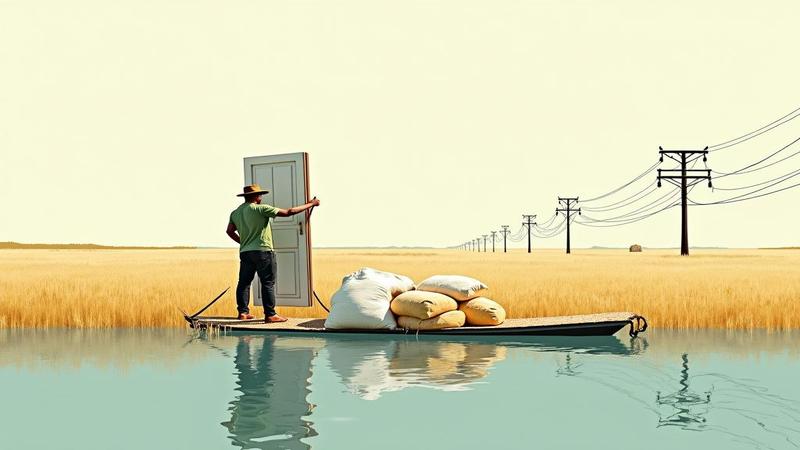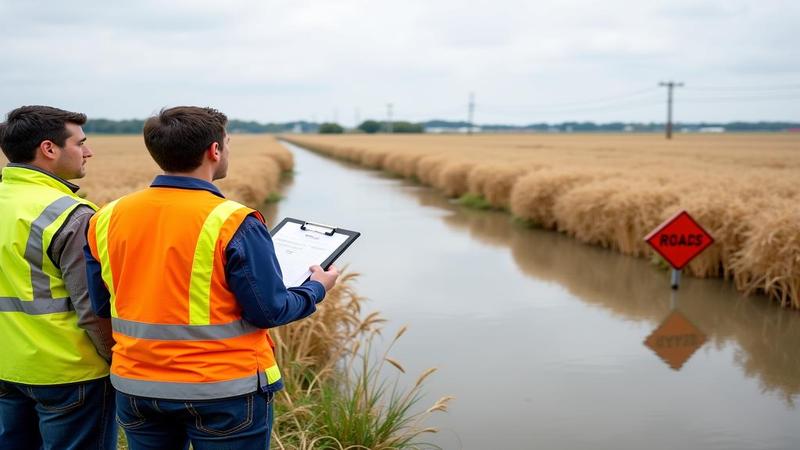Punjab’s Breadbasket Announces It Is Now A Soup Bowl

Punjab, the place where wheat once posed for passport photos, has reinvented itself as a regional aquarium. The breadbasket is now a soup bowl, and someone lost the ladle. Even the scarecrows have asked for life jackets and a transfer to the desert.
I arrived where the road ends and the river auditions for a highway. Policy has turned liquid, filing itself from cumulonimbus to inbox with admirable efficiency. My notebook fogged up, which is how data now behaves in the field: as weather.
Officials called it a once-in-a-century event, which is odd, because the century keeps turning up weekly like a clingy calendar. The “unprecedented” stamp is down to its rubber sole, still used liberally on everything from maps to kayaks labeled ‘tractor.’ Evacuation advice remains clear: proceed to higher ground, preferably a rumor.
Wheat has transitioned careers, newly identifying as rice by force of circumstance. Tractors learned backstroke; buffalo applied for maritime visas; a scarecrow filed a complaint with the Department of Navigation. The fields are taking gap years as lakes until further policy notice.
International help arrives by helicopter and hashtag, mostly in the form of empathy with good lighting. Climate change, reached for comment, sent an out-of-office reply reading, “It’s always you, never me.” Insurance adjusters have adopted snorkels as business casual and are counting raindrops one receipt at a time.
Searches for portable submersible sludge pump soared as living rooms rebranded as aquariums with open-plan fish. A neighbor demonstrated flood-readiness by laminating his entire house; the house floated away intact, a bungalow-shaped yacht of paperwork. Meanwhile, the village loudspeaker now reads tides like horoscopes: today you are a water sign.

The government pledged a “resilience corridor,” which appears to be a bridge built from press conferences, strung between two sandbags and a promise. New taxes were announced on flotation devices, including sofas. Weather apps pushed an update: fields are now oceans with in-app purchases.
Markets performed their usual miracle of levitation; flour rose faster than water, finally achieving cloud status. Bread is artisanal again, in that it requires a wetsuit and a bank loan. The breadbasket is now a levain lagoon, perfect for sourdough that proofed itself out of town.
Aid groups deployed clipboards, acronyms, and tote bags with heroic zippers. Along with rice and tarps, volunteers handed out chlorine water purification tablets, because nothing says modernity like disinfected apocalypse. Every sack carried three logos and a single instruction: stir, then hope.
Children renamed the new rivers after cabinet ministers, who remain unmoved by the honor but very moved by the water. Diesel floats beside the documents that authorized it, both hydrated, both plausible deniabilities on the loose. Rumor outran the flood by a length and stopped for tea.
Neighbors now measure distance in paddles and policy cycles. Export routes have been updated to ‘nautical,’ with tariffs payable in koi. The World Bank offered a lifeline denominated in buoyant interest; Europe wired a heartfelt paragraph in recycled empathy.
By dusk the mosque’s loudspeaker stitched prayers to weather bulletins, while a stork balanced on a traffic sign declaring “Dry Port.” At crossings, ports, and provisional rooms with ceilings of sky, policy continues to become weather, and weather audits our receipts. Punjab’s breadbasket will return, officials vow, once the toast stops being scuba-certified—so any minute now, give or lake.
